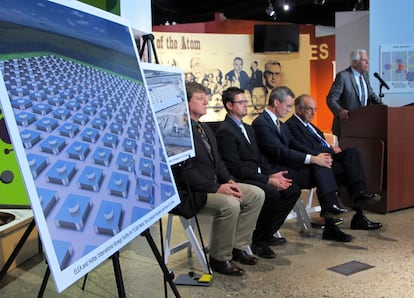US regulators OK spent nuclear fuel facility in New Mexico
New Mexico Gov. Michelle Lujan Grisham and the state’s congressional delegation oppose putting the storage complex in the state. They fear New Mexico will become the nation’s dumping ground for spent nuclear fuel

U.S. nuclear regulators have licensed a multibillion-dollar complex to temporarily store tons of spent fuel in New Mexico from commercial nuclear power plants around the nation.
The Nuclear Regulatory Commission issued its decision Tuesday about the proposed project in southeastern New Mexico.
Gov. Michelle Lujan Grisham and the state’s congressional delegation oppose locating the storage complex in the state, saying they fear New Mexico will become the nation’s dumping ground for spent nuclear fuel because the federal government has no permanent solution for the waste piling up at commercial reactors around the country.
New Mexico approved legislation in March aimed at stopping the project. The fight is expected to end up in court, with state lawmakers saying their new law requires Holtec International, the energy company that wants to build the facility, to acquire construction permits from the state.
New Jersey-based Holtec has argued that the New Mexico measure requiring consent is pre-empted by federal law and that a court fight would only delay the economic boon that would come from building the complex. The company has spent an estimated $80 million pursuing a 40-year license to build and operate the facility in southeastern New Mexico.
Company officials and some elected leaders from southeastern New Mexico have been pushing hard to offer what they call a temporary solution to the nation’s problem of spent nuclear fuel. Nuclear reactors across the country produce more than 2,000 metric tons of radioactive waste a year, according to the U.S. Department of Energy, with most of it remaining at the sites that produce it because there’s nowhere else to put it.
Since the federal government has failed to build a permanent repository, it reimburses utilities to house the fuel in either steel-lined concrete pools of water or in steel and concrete containers known as casks at sites in nearly three dozen states. The cost of that practice is expected to stretch into the tens of billions of dollars over the next decade.
The New Mexico project would have capacity to temporarily store up to 8,680 metric tons of used uranium fuel. Future expansion could make room for as many as 10,000 canisters over six decades. The material would be transported to New Mexico via rail.
Despite critics’ concerns about recent railway accidents, Holtec officials say testing has shown the casks used to hold the spent fuel would not release radiation even in the event of a derailment.
President Joe Biden has received dueling letters from project supporters and from Lujan Grisham as well as others who oppose it. The administration has acknowledged the role nuclear power will have to play in reaching its carbon emission goals, and earlier this year put up $26 million in grants for communities interested in studying potential of hosting interim storage sites.
Similar battles over what to do with the spent fuel have been waged in Nevada, Utah and Texas over the decades as the U.S. has struggled to find a home for the material and other radioactive waste. The proposed Yucca Mountain project in Nevada was mothballed and a temporary storage site planned on a Native American reservation in Utah was sidelined despite being licensed by the NRC in 2006.
Elected leaders in Texas were unsuccessful in keeping the NRC from licensing a similar project in 2021. The site at the center of that fight is near the Texas-New Mexico border, where Integrated Storage Partners LLC plans to store up to 5,000 metric tons (5,512 tons) of spent fuel and about 230 metric tons of low-level radioactive waste for 40 years. Future phases could boost that capacity to 40,000 metric tons of fuel.
Sign up for our weekly newsletter to get more English-language news coverage from EL PAÍS USA Edition
Tu suscripción se está usando en otro dispositivo
¿Quieres añadir otro usuario a tu suscripción?
Si continúas leyendo en este dispositivo, no se podrá leer en el otro.
FlechaTu suscripción se está usando en otro dispositivo y solo puedes acceder a EL PAÍS desde un dispositivo a la vez.
Si quieres compartir tu cuenta, cambia tu suscripción a la modalidad Premium, así podrás añadir otro usuario. Cada uno accederá con su propia cuenta de email, lo que os permitirá personalizar vuestra experiencia en EL PAÍS.
¿Tienes una suscripción de empresa? Accede aquí para contratar más cuentas.
En el caso de no saber quién está usando tu cuenta, te recomendamos cambiar tu contraseña aquí.
Si decides continuar compartiendo tu cuenta, este mensaje se mostrará en tu dispositivo y en el de la otra persona que está usando tu cuenta de forma indefinida, afectando a tu experiencia de lectura. Puedes consultar aquí los términos y condiciones de la suscripción digital.








































